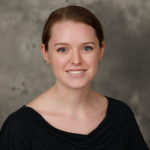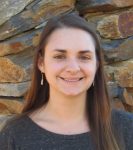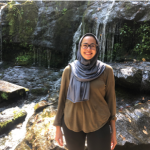Alex George

Alex earned his B.S. in environmental science from the University of South Carolina in 2016. Prior to graduate school, he had work experiences in environmental chemistry, microbiology, and immunology, and eventually developed a passion for environmental toxicology. His research in the Meyer lab involves mechanisms of mitochondrial DNA (mtDNA) damage processing and removal. Outside the lab, you can find him enjoying comedy in all its forms, finding weird things at thrift stores, and spending time with his dog.
PhD Program: Environment
Faculty Advisor: Joel Meyer, PhD
2024-2025 Status: 3rd year
Pronouns: he / him / his
Aliyah Webster

Aliyah earned her B.S. in Biochemistry from Spelman College in Atlanta, Georgia. Her undergraduate research experience as an organic chemistry lab assistant consisted of improving the Syntheses of Aspirin and Acetaminophen lab procedures. Aliyah’s summer research experiences include her research with G.C. Therapeutics, Inc. on neurodegenerative disorders that could benefit from cell therapy, her research at The Johns Hopkins School of Medicine on the efficacy of CEST MRI evaluation of glutamine utilization and ASCT2 transport in human prostate cancer, and her fellowship with Station1, a higher-education institution dedicated to socially-directed science and technology. Aliyah’s most recent research experiences include her analysis of biosynthetic gene clusters to identify novel producers of known antibiotics in the root microbiome, as well as the sampling and measurement of lead concentrations in soil and drinking water around Atlanta’s West End using different analytical techniques. Aliyah is interested in researching the toxicological effects of hazardous facilities on human health and improving health outcomes in communities subjected to environmental injustice. In her free time, Aliyah likes to run 5Ks, dance, mentor, and go to concerts and music festivals.
PhD Program: Unaffiliated
Faculty Advisor: N/A
2024-2025 Status: 1st year
Contact: aliyah.webster@duke.edu
Pronouns: she / her / hers
LinkedIn: https://www.linkedin.com/in/aliyahwebster/
Amelia Foley

Amelia earned her B.S. in Environmental Health Science from the University of Georgia in 2022. As an undergraduate she conducted research in environmental microbiology, working on projects relating to aquatic microbiology, freshwater microplastics, and molecular epidemiology/COVID-19 surveillance. In the Gunsch lab, she aims to focus her doctoral research on bioremediation and emerging contaminants.
PhD Program: Civil & Environmental Engineering, Environmental Health Engineering track
2024-2025 Status: 3rd year
Pronouns: she / her / hers
Andrew Wrench

Andrew earned his B.S. in Psychology from Howard University in 2021. In his undergrad, he conducted research at Howard on the formulation of over-the-counter anti-inflammatory drugs involving CBD, as well as research on physiological responses to racialized events and stereotypes. He also completed an internship at UCLA, with the UC-HBCU program, aimed at identifying the potential uses of biosensors in mice models to improve therapy for alcoholism. In his doctoral studies at Duke, he researches how bacteria you might otherwise find on healthy skin can influence immune activity through cytokine production and contribute to worsening infection. When he’s not in the lab, or class, you can probably find him thinking about his project car!
PhD Program: Civil & Environmental Engineering
2024-2025 Status: 4th year
Pronouns: he / him / his
Anna Villalobos Santeli

Anna completed research in marine and aquaculture molecular genomics at The Virginia Institute of Marine Science prior to her acceptance as an Environmental Health Engineering track PhD student. Now in an organic chemistry lab, she is interested in the use of non-target LC-HRMS for characterization of polymer additives in microplastic fibers. More specifically, she is studying disperse azobenzene dyes and PFAS-related compounds in synthetic fabrics. Her research focuses on measuring the “movement” or desorption of these compounds from the fibers into water, plus their biological uptake in oysters.
PhD Program: Civil & Environmental Engineering, Environmental Health Engineering track
2024-2025 Status: 7th year
Pronouns: she / her / hers
Beverly Jones deSouza

Beverly earned her B.S. in Biology from Massachusetts Institute of Technology then worked as a research technician in several labs studying a range of topics, including immunology, cancer biology, and sex determination. Afterward, she devoted several years to being a stay-at-home mom, then returned to school at Duke and earned a Master of Environmental Management degree with a concentration in Ecotoxicology and Environmental Health. Her Master’s Project examined the toxicity of metabolites created during bioremediation of environmental contaminants. In the Hirschey Lab, she will be studying how environmental exposures influence epigenetic regulation of metabolism.
PhD Program: Pharmacology
2024-2025 Status: 5th year
Brittney Mitchell

Brittney earned her B.S. in Marine Biology and B.A. in Chemistry with a minor in Astronomy-Physics from Humboldt State University. As an undergraduate, she conducted research studying climate change impacts on urchin-macroalgae feeding relationships, and pollution impacts on bryozoan larval settlement and metal bioaccumulation in macroalgae. She is currently a first-year PhD student in Dr. Daniel Rittschof’s lab. Brittney is excited to engage in interdisciplinary research to investigate the toxicological impacts of antifouling management on biofouling communities. Ultimately, she hopes her research will contribute to the development of environmentally responsible solutions that help satisfy the needs of marine industries while conserving marine habitats.
PhD Program: Marine Science & Conservation
2024-2025 Status: 3rd year
Pronouns: she / her / hers
Cameron Rankin

Cameron earned his B.S. in Biology with a major in Hispanic Studies from Davidson College in 2021. As an undergraduate, he conducted research examining the cytotoxicity of waterpipe tobacco smoke on alveolar cells. He also spent two years at the National Institute of Arthritis and Musculoskeletal and Skin Diseases investigating the effect of CHIP mutations on inflammation and investigating suitability of serum biomarkers in monitoring active inflammation in Takayasu’s arteritis. He is currently a first year PhD student interested in combining his prior research in toxicology and human health to understand how exposures affect health outcomes and the environment.
PhD Program: Environment
Faculty Advisor: Rob Tighe, PhD
2024 – 2025 Status: 2nd year
Contact: cameron.rankin@duke.edu
Pronouns: he/him/his
LinkedIn: https://www.linkedin.com/in/cameron-rankin-170120182/
Christina Bergemann

Christina graduated with her B.S. degree in Environmental Science from the University of North Carolina at Chapel Hill. After graduating, she worked in the Nicholas School for two years, looking at how preconception exposure to toxicants alters mitochondrial function in offspring. In the future, she hopes to explore how diet and the microbiome can influence chemical susceptibility and mitochondrial function.
PhD Program: Environment
2024-2025 Status: 5th year
Corbin Hite

Corbin earned a B.S. in biological sciences from the University of Notre Dame with a concentration in infectious disease & global health and a minor in energy studies. His undergraduate research experiences surrounded anthropogenic change on freshwater systems, and his thesis investigated the impact of invasive vegetation on Pacific salmon in Alaskan lakes. In his free time, Corbin enjoys running, hiking, sand volleyball, and playing board games.
PhD Program: unaffiliated
Faculty Advisor: N/A
2024-2025 Status: 1st year
Contact: corbin.hite@duke.edu
Pronouns: He/him/his
LinkedIn: https://www.linkedin.com/in/corbin-hite-0663731a8/
Elizabeth Boxer

Elizabeth Boxer earned her B.A. in Environmental Studies with a Biology minor from Northeastern University in Boston. While at Northeastern she conducted research on the social and scientific discovery of per- and polyfluoroalkyl substances (PFAS) at the Social Science Environmental Health Research Institute. This work included helping to create the first national database and map of U.S. PFAS drinking water contamination. After undergraduate she worked at Accenture in their Health and Public Service practice for two years before moving to California to pursue her MPH in Environmental Health Sciences at UC Berkeley. While at Berkeley, she interned at California’s Office of Environmental Health Hazard Assessment (OEHHA) in their Reproductive and Cancer Hazard Assessment Branch and conducted a meta analysis of maternal PFHxS exposure and infant birthweight for her master’s capstone. She is excited to continue to follow her passions in reproductive and developmental health at Duke working under Dr. Kate Hoffman evaluating maternal and infant exposure to semi-volatile organic compounds (SVOCs) and childhood immune outcomes.
PhD Program: Environment
2024-2025 Status: 3rd year
Pronouns: she / her / hers
Emily Green

Emily earned her B.S. in Biology and her B.S. in Marine Science at the University of Miami. After graduation, she joined the Reproductive and Developmental Toxicology Branch at the US EPA as an ORISE Fellow, where her research focused on assessing toxic mixture interactions with in vitro bioassays and mathematical models. Emily’s thesis research investigates the effect of the microbiome in mediating embryonic development and xenobiotic responses. She utilizes lab-reared zebrafish as a mechanistic model and wild-caught Atlantic killifish with different pollution adaptation histories as an ecological model to uncover the interactions between the microbiome, embryonic development, and organismal responses to chemical stressors. When she is not in the lab, she enjoys rock climbing, mountain biking, hiking, and exploring new places!
PhD Program: Environment
2024-2025 Status: 4th year
Pronouns: she / her / hers
Guru Ulaganathan

Guru earned his B.S. in Microbiology, Immunology and Molecular Genetics from the University of California, Los Angeles (UCLA) in 2023. As an undergraduate, his research centered around using C. elegans as a model to study chemical reprotoxicity. At Duke, he aims to focus his doctoral work on chemical mixtures and developmental neurotoxicity. Outside the lab, Guru is usually reading whodunnits or occasionally biking at night.
PhD Program: Environment
Faculty Advisor: Susan Murphy, PhD
2024 – 2025 Status: 2nd year
Contact: guru.ulaganathan@duke.edu
Pronouns: he/him/his
LinkedIn: www.linkedin.com/in/gurugowtham-ulaganathan-076187175
Ilaria Merutka

Ilaria came to environmental toxicology with a background in biochemistry (B.S. 2017, Univ of Chicago) and cell biology (research technician, OHSU). Her thesis work in the Jayasundara Lab investigates the subcellular mechanisms by which chronic exposure to environmental toxicants deteriorates kidney health over time. She uses zebrafish as a mechanistic model to disentangle how lysosomal function, mitochondrial function, and the regulatory networks that govern them fail as a result of extended exposure to agrochemical metals and glyphosate. She is passionate about ecological gardening, hiking, video games, and improving the translatability of toxicology research to citizens and other scientific fields.
PhD Program: Environment
2024-2025 Status: 5th year
Pronouns: she / her / hers
Joshua Prince

Josh is a graduate student in the Systems for Engaging the Environment Lab headed by PI A-Andrew Jones in the Civil and Environmental Engineering Department at Duke. His research focuses on the interactions between biofilms and nanoparticles in both environmental and medical contexts, and has three major arms. The first arm focuses on developing novel bacterial growth models for planktonic bacterial growth when exposed to metal oxide nanoparticle dispersions. The second arm focuses on quantifying quantum dot accumulation in Bacillus subtilis biofilms using a combination of microfluidics and confocal microscopy. The final arm focuses on higher-level ecotoxicological of nano-particulates in the environment by synthesizing common environmental fate and exposure modelling into a single framework.
Josh’s research interests include confocal microscopy imaging of bacterial biofilms, finite-difference simulations, modelling of bacterial growth, metal oxide nanoparticle preparation/characterization, quantitative environmental fate modelling, and application of mass-transport to nanoparticle contexts.
PhD Program: Civil & Environmental Engineering
2024-2025 Status: 6th year
Pronouns: he / him / his
Karina Cuevas Mora

Karina earned her B.S. in Biochemistry and Molecular Biology from Penn State University and an M.S. in Biomedical Sciences from Jefferson University. During her master’s program, she worked full-time as a research technician studying the effects of chronic versus acute injury in the lung. She also worked on identifying biased ligands for the treatment of severe asthma. Her work and courses at Jefferson sparked the passion for understanding the effects of environmental toxicants on the human body. Outside of the lab you can find her spoiling her dog, Orfelio, or watching stand-up comedy.
PhD Program: Pathology
2024-2025: Status: 2nd year
Faculty Advisor: Liping Feng, PhD
Contact: karina.cuevasmora@duke.edu
Pronouns: she/her/hers
Katherine (Kate) Morton

Kate earned her B.S. in Biochemistry and B.A. in Political Science (National Security) from Virginia Tech, where she studied mosquito genome modifications and colonial-indigenous interactions in colonial South America. Her interest in toxicology emerged with the hopes of understanding anthropogenic impact on the environment and the ability of research and policy to mediate these negative effects. Her thesis work in the Meyer lab utilizes C. elegans to investigate the role of mitochondrial toxicants in dopaminergic neurodegeneration. Outside of the lab you could find her baking, travelling, or spoiling her puppy Stitch.
PhD Program: Environment
2024-2025 Status: 6th year
Pronouns: she / her / hers
Laura Jameson

Laura earned her B.S. in Cognitive Science, Neuroscience track from University of California, Davis then worked as a research technician in Dr. Maxwell Leung’s lab at Arizona State University studying the possible co-exposure effects of cannabinoids and contaminants in the neurological function of model organism c. elegans. In order to assess which contaminants pose risks to consumers, she led the effort to make a comprehensive list of all regulated contaminants in cannabis across the U.S. As an undergraduate she studied nuclear anchorage and migration proteins creating CRISPR mutations in Dan Starr’s lab at UC Davis.
PhD Program: Environment
Faculty Advisor: TBD
2024-2025 Status: 3rd year
Mackenzie Laney

Mackenzie earned her B.S. in Marine Biology and B.A. in Chemistry from the University of North Carolina Wilmington in 2021. During her undergraduate studies she conducted an honors thesis on the impacts of Hurricane Florence on the benthic population of the Cape Fear River estuary, and also fell in love with teaching organic chemistry. In the year between starting graduate school, she worked as a lab technician in an analytical chemistry lab in Denver, Colorado. In 2024, she earned a Master’s in Marine, Atmospheric and Sustainability Sciences at Stony Brook University, and her thesis investigated the bioaccumulation of PFASs by marine polychaetes. In her free time, she enjoys going to concerts, hiking, and reading.
PhD Program: Unaffiliated
Faculty Advisor: N/A
2024-2025 Status: 1st year
Pronouns: she/her/hers
Morgan Orsolini

Morgan completed a B.S. in Animal Sciences at California Polytechnic State University, San Luis Obispo, and an M.S. in Animal Biology at University of California, Davis. Her Master’s thesis examined the relationship between biophysical properties of stallion spermatozoa and fertility, and subsequent selection of sperm for in vitro fertilization. Morgan also completed a year with the San Diego Zoo Reproductive Sciences team studying physiological stress and endotheliotrophic herpes virus in elephants. Morgan joined Duke’s Integrated Toxicology and Environmental Health program in order to learn how different toxicants can affect fertility and the progression of embryo development and pregnancy.
PhD Program: Environment
Faculty Advisor: Danny Schust, PhD & Doug Raburn, PhD
2024-2025 Status: 2nd year
Contact: morgan.orsolini@duke.edu
Pronouns: she / her / hers
Rebecca Hoehn

Rebecca is a 4th year PhD student in the Stapleton lab. She earned her B.S. in Pharmacology and Toxicology at the University of Wisconsin-Madison in 2020, alongside certificates in Global Health and Environmental Studies. Her undergraduate research on the fate and transport of organic contaminants in crop plants fostered her interest in environmental chemistry and human health, which drew her to join Duke’s Integrated Toxicology and Environmental Health Program (ITEHP). Alongside her doctorate, Rebecca is also pursuing a Certificate in College Teaching. During her time at Duke, Rebecca is excited to investigate personal exposure to volatile organic contaminants, and hopes her work will aid in deducing sources of contaminant exposure in the indoor environment. She is particularly interested in understanding the linkages between contaminant exposure and human health outcomes. Outside of the lab, Rebecca enjoys spending time outdoors, trying new local cuisine, painting and crafting, and tending to her many houseplants.
PhD Program: Environment
2024-2025 Status: 4th year
Pronouns: she / her / hers
Samantha Phelps

Born in Charlotte, NC but raised in Buffalo, NY, Sam earned her B.S. in Biochemistry and Neuroscience from the University at Buffalo in 2021. During her undergraduate degree she studied a range of things, from ion channels to structural biology. After earning her Bachelor’s degree, she remained at the university as a lab technician in a biochemistry lab, where she studied mechanisms of eukaryotic DNA damage and repair and their role in the balance between genome stability and instability. At Duke, she plans to dive deeper into the field of environmental toxicology in the hopes of understanding of how toxicants affect physiological processes. Outside the lab, you can find her hiking, backpacking, playing videogames, or reading.
PhD program: Environment
Faculty Advisor: Nishad Jayasundara
2023-2024 Status: 2nd year
Contact: samantha.phelps@duke.edu
Pronouns: she/her/hers
Shaza Gaballah

Shaza is a sixth-year PhD student in the Stapleton lab. Growing up, she lived all over the Triangle, and received her B.S. in Biology with minors in Chemistry and Medical Anthropology from UNC Chapel Hill in 2017. After graduating, she completed a two-year fellowship at the US EPA, where she investigated how exposure to GenX and other PFAS impacts developmental toxicity and developmental neurotoxicity in zebrafish. Her work identified shared toxicity phenotypes in zebrafish based on varying PFAS chemical structures. Shaza’s work at the EPA was her first time delving into toxicology, and she loved it so much that she applied to Duke’s environmental toxicology program. She is currently investigating how brominated flame retardants such as polybrominated diphenyl ethers (PBDEs) cross the placental barrier and impact fetal growth and development. Shaza is also interested in how in utero exposure to these environmental contaminants can impact endocrine disruption. When she’s not in the lab, Shaza loves cheating at crosswords, rock climbing, and hanging out with her cat, Olive.
PhD Program: Environment
2024-2025 Status: 6th year
Pronouns: she / her / hers
Sierra Smith

Sierra earned her B.A. in Neuroscience with a concentration in Environmental Studies from Kenyon College in 2022. As an undergraduate, she conducted research on how the extracellular environment of a nerve influences peripheral nervous system patterning. After graduation, Sierra joined the Duke cell biology department as a research technician where she studied tissue morphogenesis using the semicircular canals of zebrafish as a model. Outside of lab, you can find her painting, backpacking, or enjoying a good book!
PhD Program: Unaffiliated
Faculty Advisor: N/A
2024-2025 Status: 1st year
Contact: sierra.smith@duke.edu
Pronouns: she / her / hers
LinkedIn: https://www.linkedin.com/in/sierra-smith-8b3942196/
Taylor Hoxie

Taylor earned a B.S. in Chemistry with a concentration in biochemistry at Wake Forest University in 2017. As an undergraduate she conducted research in organic chemistry synthesizing novel PI3K inhibitors for prostate cancer treatments. Prior to starting grad school at Duke, she spent two years working at the Duke Human Vaccine Institute (DHVI). At DHVI, she genotyped human and non-human primate samples to characterize Fc receptors and their role in HIV pathogenesis. In the Stapleton lab she is investigating per- and polyfluoroalkyl substances (PFAS) in consumer products and in the indoor environment. Her interests include discovering known and unknown PFAS in consumer products and assessing the role of the indoor environment (as well as behaviors and housing characteristics) in exposure to PFAS. Outside of the lab Taylor enjoys playing with her dog Cocoa, binging Netflix shows, and eating a lot of food at restaurants across the Triangle!
PhD Program: Environment
2024-2025 Status: 6th year
Pronouns: she/ her /hers
Tenley Weil

Tenley earned her B.S. in Neurobiology from the University of Washington in 2018. Upon graduating, she worked at the National Institute of Mental Health for several years researching chronobiology in the Section on Light and Circadian Rhythms. Through her work at the NIMH she became interested in how external factors affect human health and decided to switch paths to study environmental health. At Duke University, Tenley now studies how air pollution, specifically ozone, affects health outcomes. In the Tighe lab, her work focuses on understanding how airway epithelial cells mediate ozone-induced injury using human primary airway epithelial cell culture. The overall goal of her project is to characterize interindividual variability in responses to ozone to identify susceptible sub-populations.
PhD Program: Environment
Faculty Advisor: Dr. Robert Tighe
2024-2025 Status: 3rd year
Pronouns: she / her / hers


























